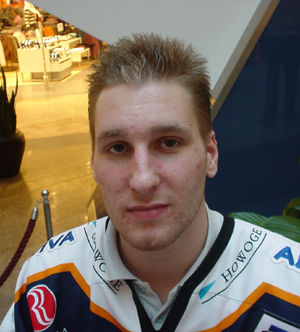
The German men's national ice hockey team is the national ice hockey team of Germany and is controlled by the German Ice Hockey Federation. It first participated in serious international competition at the 1911 European Hockey Championship. When Germany was split after World War II, a separate East Germany national ice hockey team existed until 1990. By 1991, the West and East German teams and players were merged into the United German team. The team's head coach is Harold Kreis.

The men's ice hockey tournament at the 1980 Winter Olympics in Lake Placid, United States, was the 14th Olympic Championship. Twelve teams competed in the tournament, which was held from February 12 to 24, 1980. The United States won its second gold medal, including a win over the heavily favored Soviet Union that became known as the "Miracle on Ice".Games were held at the Olympic Fieldhouse (8,000) and the Olympic Arena (2,500).

The men's ice hockey tournament at the 1972 Winter Olympics in Sapporo, Japan, was the 12th Olympic Championship. Games were held at the Makomanai Ice Arena and at the Tsukisamu Indoor Skating Rink. The Soviet Union won its fourth gold medal. The United States won the silver, while Czechoslovakia won the bronze. Canada did not send a team to the event for the first time since ice hockey was first competed at the Olympics in 1920, instead competing with and defeating the Soviets in a competition later that year known as the Summit Series. Canada would not send a men's hockey team to the Olympics until 1980.

Ice hockey tournaments have been staged at the Olympic Games since 1920. The men's tournament was introduced at the 1920 Summer Olympics and was transferred permanently to the Winter Olympic Games program in 1924, in France. The women's tournament was first held at the 1998 Winter Olympics.

The Great Britain men's national ice hockey team is the national ice hockey team that represents the United Kingdom. A founding member of the International Ice Hockey Federation (IIHF) in 1908, the team is controlled by Ice Hockey UK.

West Germany competed at the Winter Olympic Games for the last time as a separate nation at the 1988 Winter Olympics in Calgary, Alberta, Canada. Following German reunification in 1990, a single German team would compete in the 1992 Winter Olympics.

West Germany competed at the 1984 Winter Olympics in Sarajevo, Yugoslavia. The German Ice Skating Union president Wolf-Dieter Montag served as the head of mission for West Germany.

West Germany competed at the 1980 Winter Olympics in Lake Placid, United States.

Germany competed at the 1992 Winter Olympics in Albertville, France. It was the first time that the nation had competed at the Olympic Games following reunification in 1990 and for the first time as a single nation since 1936. Previously, West Germany and East Germany had sent independent teams to the Games.

EV Landshut, also known as EVL Landshut Eishockey and formerly known as the Landshut Cannibals, are a professional ice hockey team based in Landshut, Bavaria, Germany. They currently play in Deutsche Eishockey Liga 2, the second level of ice hockey in Germany. They were promoted from the third-tier Oberliga in 2019 after winning the Oberliga finals against the Tilburg Trappers.
Johannes Rampf was a German ice hockey player. He participated at the 1956 Winter Olympics and 1960 Winter Olympics. He was inducted into the International Ice Hockey Federation Hall of Fame in 2001.

Karl Heinz Friesen is a Canadian-born German former professional ice hockey goaltender. Friesen spent most of his career in Germany, playing in the Eishockey-Bundesliga and Deutsche Eishockey Liga, but he also played four games in the National Hockey League with the New Jersey Devils during the 1986–87 season. Internationally Friesen represented both West Germany and Germany at multiple tournaments, including the 1984, 1988, and 1992 Winter Olympics, and six World Championships.

Richard "Bibi" Torriani was a Swiss ice hockey player and coach, and luge athlete, also known as Riccardo Torriani.
The 1987 Ice Hockey World Championships was the 52nd such event hosted by the International Ice Hockey Federation. It was also the 63rd European Championships. Teams representing 28 countries participated in four levels of competition.

André Rankel is a German professional ice hockey forward. He is currently an unrestricted free agent who most recently played for the Eisbären Berlin in the Deutsche Eishockey Liga. He began playing in the DEL in 2003 with Berlin.

The ice hockey (hockey) competitions of the 2018 Winter Olympics were played at two venues within the Gangneung Coastal Cluster in Gangneung, South Korea. The Gangneung Hockey Centre, which seats 10,000, and the Kwandong Hockey Centre, which seats 6,000, were both originally scheduled to be completed in 2016 but appear to have been completed in early 2017. Both venues contain Olympic-sized rinks.
The men's tournament in ice hockey at the 2018 Winter Olympics was held in Gangneung, South Korea between 14 and 25 February 2018. Twelve countries qualified for the tournament; eight of them did so automatically by virtue of their ranking by the International Ice Hockey Federation, one, South Korea, automatically qualified as hosts, while the three others took part in a qualification tournament.
These were the team rosters of the nations participating in the men's ice hockey tournament of the 2018 Winter Olympics. Each team was permitted a roster of 22 skaters and 3 goaltenders.
Bernd Truntschka is a German former ice hockey player. He competed in the men's tournaments at the 1988 Winter Olympics, the 1992 Winter Olympics and the 1994 Winter Olympics.










